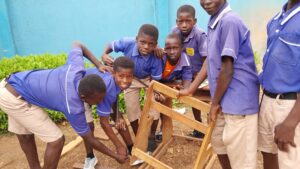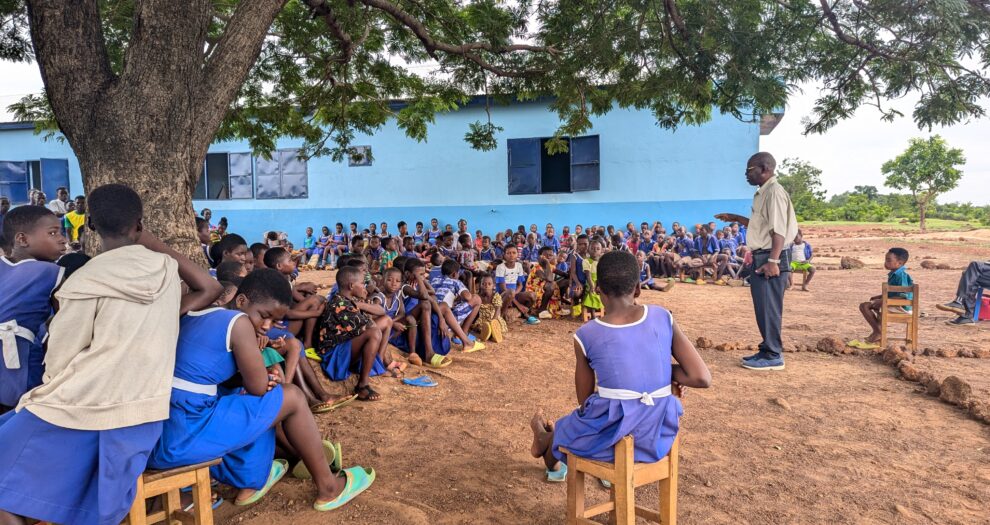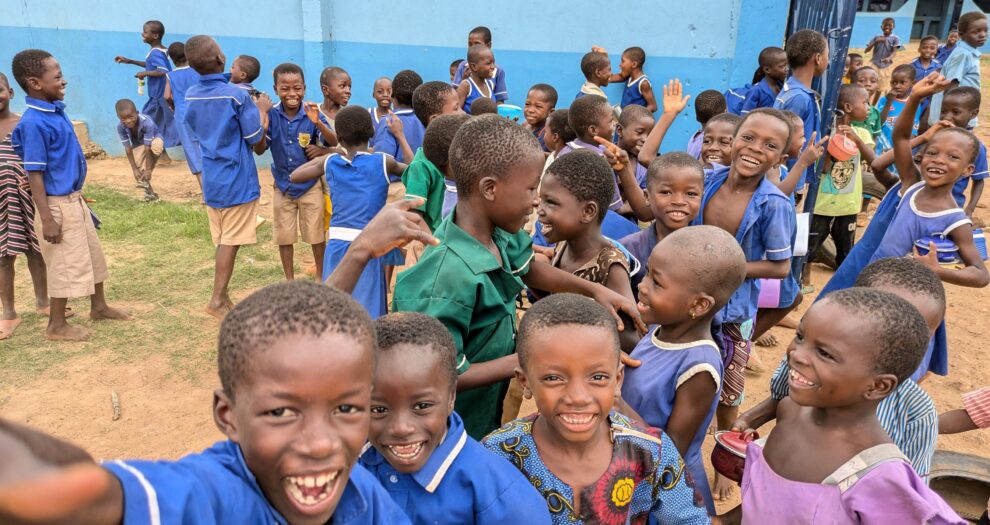Welcome to our Summer 2025 Newsletter
Savannah Education Trust is a charity providing an education for some of the poorest children in West Africa. We now have ten Christian schools in remote villages in northern Ghana: Bagri, Gberi, Korh, Pavuu, Mettoh, Tungan-Zagkpee, Boo, Baapari, Danko-Buree and Lyssah. The charity also ensures every schoolchild receives a meal each day and has a programme of supporting teachers in this remote and poor area.
Technical High School
Note: The photos are of a technical high school we have visited in another part of Ghana

Over the past few newsletters, we have mentioned the possibility of a Technical High School for the area.
The village schools built by Savannah are proving to be a great blessing: both to each child who attends them and also to the community as a whole. Our original aim – that every child in this area should have access to education – has almost been fulfilled through our network of schools across ten sites in this area of northern Ghana. Once their education is finished, some of our pupils return to their farms to a tough life of subsistence farming – yet they still enjoy the benefit for the rest of their lives that an education brings (including, for example, knowledge of improved farming techniques). Others continue with their education, attending secondary school and even continuing with their studies to gain a professional qualification. For example, we have previously featured Meshech in a newsletter: he was one of our very first pupils at Bagri School, who is now training to be a doctor.
But there are others, like Ama, a bright and determined 14-year-old girl from a small village near Lawra. Ama has completed Junior High School at one of our existing village schools. Her family, like many in the region, relies on subsistence farming, and life is a constant struggle against poverty and limited opportunities. Ama’s prayer, and her dream, is for a future where she can contribute to her family’s well-being.

Without a Technical High School, Ama’s options for further education are limited. Senior High Schools, such as the one in Lawra, focus on more academic pathways whereas she wants to learn a practical trade and start a small business to help her family. Without vocational skills, her chances of securing stable employment or starting her own enterprise are slim, making the cycle of poverty difficult to break. Many young people like Ama are forced to migrate to cities in search of work, often with few skills, leaving them vulnerable to exploitation.
Increasingly, the team on the ground has become convinced that there is a need to provide vocational education to support young people like Ama who want to learn a particular skill or trade. All are agreed that this remote, largely rural area needs a flourishing local economy – based on a diverse range of small but growing businesses – to raise it out of deep poverty.
We have very kindly received initial funding for a Technical High School and have now purchased a plot of land on the edge of Lawra. In March, we travelled to Ghana to hold a series of planning meetings with the team to work through the logistics of the project. God willing, we hope to begin in relatively modest fashion with three subjects: dressmaking (textiles), electrical engineering, and welding. The cluster of school buildings required will therefore be more complex than our existing schools and will include simple workshops alongside the classrooms. As with our existing schools, we plan to provide a meal for each student each day. There is scope to expand according to demand.
We have close relations with the Ghana Education Service already, and in discussions they have expressed enthusiasm for the project and a willingness in principle to take on the running costs once it is operational.
We are grateful for your prayer and support as we embark on this exciting and challenging new venture.
Elijah

In previous newsletters, we have featured various important members of our school community: individual pupils, teachers, staff members and even the Paramount Chief of the area (a keen supporter of Savannah’s work).
Elijah is a different category. He is a pastor. We first met him on our very first visit to northern Ghana, exactly twenty-five years ago. At that point, he was a young man ministering in Nandom, a town just under 20 miles north of Lawra, not far from the Burkina Faso border. It seemed a distinctly unpromising place for a fledgling church, and we vividly remember a couple of vultures looking down menacingly as we sat in the centre of the town.
A quarter of a century later, though now at a different church, Elijah has remained faithful to his calling. He has also recently taken on an additional involvement with Savannah as one of a number of pastors who regularly spend time in schools, taking assemblies and working with the pupils.
When we were in Ghana recently, we sat down to talk with Pastor Elijah, underneath a large acacia tree outside one of the Savannah schools. As pupils wandered past (and the occasional goat), we talked to him about his ministry. He described his work among the schools as a “privilege.” He explained that when he is in the schools, he “encourages the children to bring out their Bibles … we will read together, and I will give an explanation. That is very important: that they read and see the Word, the Bible, for themselves – so they will not think that we are teaching them our own minds but we are encouraging them to read for themselves.” His prayer, he added, is that the children might have a “personal faith and become the children of God.” This personal faith, he went on to say, was given to him when he was a child: his family were all idol wors hippers, but his life was changed from that moment. As we come to the end of the conversation, he adds a comment that perhaps summarised his thoughts about his ministry among the schools. “Education without salvation will be nothing.”
hippers, but his life was changed from that moment. As we come to the end of the conversation, he adds a comment that perhaps summarised his thoughts about his ministry among the schools. “Education without salvation will be nothing.”
Savannah organises regular meetings of the headteachers from our schools. At their last meeting, they spoke warmly of how much the school community appreciates these pastoral visits. Interestingly, they noted that discipline improves when pupils are taught the Bible. They emphasised that visits by pastors also positively affects poor attendance, given that the pastors talk to the students and encourage them. This testimony of headteachers neatly summarises the fact that Savannah, right from the beginning, has had both humanitarian and spiritual motivations – and has never seen the two as being in tension.
Building Work Update
Alongside the ongoing programme of refurbishment work, the following one-off projects have been taking place over recent months:
 Teachers’ accommodation We remain grateful to those who have contributed to our project to provide teachers’ accommodation in the most remote of our villages. Without this provision, it is hard to attract and retain teachers. We are glad to report that the accommodation at our schools in Boo and Korh are virtually complete, with the painting and fitting out to follow across the summer.
Teachers’ accommodation We remain grateful to those who have contributed to our project to provide teachers’ accommodation in the most remote of our villages. Without this provision, it is hard to attract and retain teachers. We are glad to report that the accommodation at our schools in Boo and Korh are virtually complete, with the painting and fitting out to follow across the summer.
We are thankful to report that, just as this newsletter was being produced, we received the welcome news of funding to provide teachers’ accommodation at another of our most remote schools.
These projects are a significant boost to the morale at our most remote schools, and the accommodation is hugely appreciated by teachers. Crucially, it allows us to attract and retain teachers at schools in rural villages. These villages have no alternative accommodation for teachers, and are difficult to access from the local market town of Lawra.
Access work at Korh If you visit Korh School during the wet season, you will struggle to access the school building. Although near the road, the school is also near swampy land and, every wet season, there are flooding problems. The Savannah team is therefore constructing a small bridge which will be of benefit both to the school and to the whole village.
A new Junior High School (JHS) at Danko-Buree The building work to create a JHS or ‘secondary school’ (in UK terms) is complete, and the school up and running. For local families this is a wonderful provision: for the first time their children can study all the way through to the national examination which is taken in Ghana at the age of 14.

New Film
We often say that we wish we could take our loyal supporters to the remote communities of north west Ghana, to meet the people and to witness the impact that the Savannah schools are having on generations of children. In most cases this is not possible, but the next best thing is to bring the work to you by capturing and showing compelling video footage. To this end, we visited Ghana with a videographer in March and we look forward to sharing these new films with you in upcoming meetings, webinars and via our website.
A tragedy
Supporters will be familiar with picturesque images of our schoolchildren crossing the Black Volta river on boats to attend school. During June, in a devastating tragedy for the area, one of those boats capsized in the river, which was swollen by recent rains. Tragically, seven children drowned. They were on their way to Lawra Secondary School.
Our thoughts and our prayers are with the bereaved families.
Finances
Our costs continue to rise in Ghana, and this has been magnified over recent months as the Ghana cedi has strengthened considerably (reducing the relative value of foreign currencies). In more than twenty years of existence, the financial picture over the last year has been our most difficult.
We therefore remain very grateful for, and entirely dependent on, your kind support. As we plan for the future, we continue to find regular direct debit contributions especially helpful. As ever, please feel free to be in contact if you would like to talk to us about any element of Savannah’s work, or you need advice on the practicalities of supporting the work (whether that is amending an existing direct debit, or discussing a legacy).
Above all, we remain thankful to the Lord who is able to supply all of our needs.








 Teachers’ accommodation
Teachers’ accommodation




